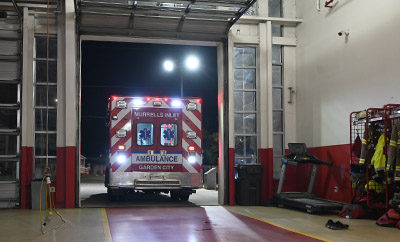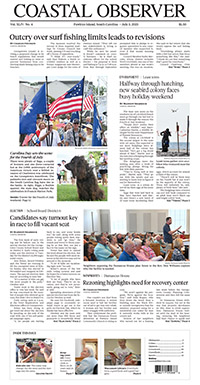Murrells Inlet
Critics of failed fire tax vote waiting to see new numbers

A consultant’s report lays out a case for the Murrells Inlet-Garden City Fire District seeking voter approval to raise property taxes.
The report that Tom Swatzel is waiting for is the district’s annual financial audit. “I think that’s critical,” he said.
Swatzel started the Friends of the Murrells Inlet-Garden City Fire District in 2014 to help pass a referendum that raised the property tax rate from 10 to 14 mills. When the district’s board went back to the voters in 2019 to raise that to 19 mills, Swatzel balked.
A political consultant who served two terms on Georgetown County Council, his opposition is noted in the report from McGrath Consulting Group that the fire district board commissioned last year in preparation for another referendum.
“I couldn’t really make the case that they needed a millage increase,” Swatzel said of the 2019 vote.
His opposition was fueled by the fact that the district didn’t have financial audits for 2014 through 2017, a period when it was discovered that an employee had embezzeled $84,000. When those audits were completed, they showed the district had overspent on its budgets and increased its surplus.
Murrells Inlet-Garden City Fire is a state special-purpose district created in 1966 to serve portions of Georgetown and Horry counties. The state lawmakers who nominate the district’s six board members also raised doubts about the 2019 vote.
“That was because the fire district was not compliant with the audits,” state Rep. Lee Hewitt said. “They needed to get their house in order before they went out and asked for additional funds.”
The fire district board plans to get a proposed compensation plan from Chief J.R. Haney this month that it will use to establish a millage rate to present to voters.
The district has struggled to hire and retain firefighters and emergency medical workers. Over 70 percent of its calls are for medical service, and Haney has implemented a plan to hire paramedic specialists who will not be required to double as firefighters. In addition, they will work shifts of 24 hours on and 72 off rather than the current 24/48 shifts.
The goal is to reduce employee burnout, but it will also require increasing the staffing on each shift.
The consultants found that “the organization is caught in a cycle that without added staff to both cover and share the workload, substantial reductions in service levels will be required.”
Swatzel said he understands the problem.
“It’s like a bidding war now for personnel. How do you compete?” he said. “The shortages in firefighters, paramedics and EMTs are a cause for concern.”
He noted that the board approved performance bonuses for staff last year of $3,100 per person. That was in addition to the bonuses already budgeted: $500 for full-time and $300 for part-time employees.
“It caught my attention,” he said.
In 2021, the district increased its reserves by $1.7 million to $6.6 million, according to the last audit. That included $1.5 million in impact fees, which are limited to capital spending.
Its current budget projects $6.9 million in revenue and expenses.
Hewitt said he hadn’t heard anything from the district about plans for a referendum.
“I know that they’re always saying they need money like everybody else. A lot of it is salary driven, like every budget presentation I heard up in Columbia,” he said.
Hewitt expects the fire district board to meet with its legislative delegation once it has a firm plan for a referendum.
He said he will be interested to learn “with the growth that we’ve had in the area, and the reassessment, how much money they have now compared to what they had in 2019.”
The last referendum was held in July 2019. Only 1,704 out of the 24,054 eligible voters cast ballots. They opposed the tax increase 1,117 to 587.
Hewitt said at the time that he talked with voters who were angry that the referendum was held outside the normal election cycle. Haney said an early summer referendum would allow the new tax rate, if approved, to appear on the tax bills that each county mails out in the fall.
“It comes down to who’s better organized and who comes up with a message that resonates with voters and taxpayers,” Swatzel said. “In the end, maybe there’s a good case for case for the increase. It’s really hard to say now.”




